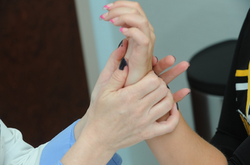- Work Injury
-
Hand
- Cysts & Tumors
- Trigger Finger
- Dupuytren's Contracture
- De Quervain's Tenosynovitis
- Hand Fractures
- Hand Arthritis
- Carpal Tunnel Syndrome
- Traumatic Hand Injuries
- Joint Replacement of the Hand
- Jersey Finger
- Boutonniere Deformity
- Mallet Finger (Baseball Finger)
- Swan Neck Deformity
- UCL Tear of the Thumb
- Osteoarthritis of the Thumb
- Wrist
- Elbow
- Shoulder
- Immediate Care Clinic
- Contact


